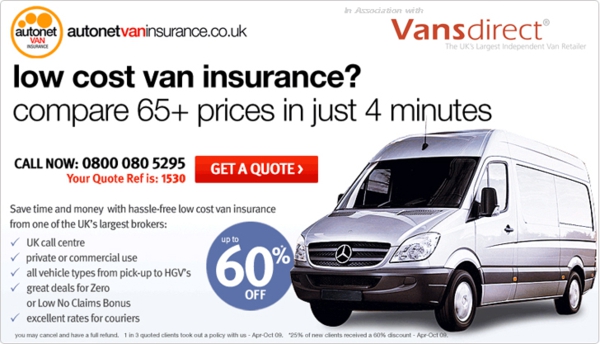In the UK insurance is compulsory for all vehicles on the road. However, there are a number of actions that can be taken in order to keep insurance costs as low. In the current economic climate, small businesses especially need to try to save as much money as possible.

Install Safety Features
One way of keeping your premiums low is to prove to your insurer that you are taking measures to ensure the safety of your vehicle. To that end, you could install a tracker system that could be used to locate the van if it is stolen.
Other safety measures include installing a gear lock and an immobiliser and ensuring the door locks are of good quality. Insurance costs will be lower if the van is parked in a lock-up garage overnight. If it is parked on private property, ensure that there are no items of value left in it overnight that might entice thieves to break in.
If you regularly transport expensive goods, you should get insurance to cover them in case of theft or damage. If you just transport the tools of your trade, such as plumbing equipment, you will need to inform your insurer. Do not, however, be tempted to under-insure these, as you will have to be able to replace them in case of loss.
Pay a Higher Excess
Another step which could be taken in order to obtain cheaper van insurance premiums is to increase your excess, which is the amount you are liable for if you put in any kind of claim.
Be realistic, though and don’t set the excess too high, as you might not be able to afford it if you have to make a claim.
Compare Quotes Online
You should also think about exactly what level of cover you want and then compare quotes on a van insurance comparison site. It is recommended that you don’t just accept the cheapest deal available, as it may not necessarily be the best value for money. Instead you should phone the potential provider and discuss the details of your policy to make sure you are getting everything that you need from the policy.
It pays to spend quite some time on determining the various aspects each policy. You need to have one that is appropriate for your business. The cheapest insurance is not always necessarily the best and you might find that cover differs widely from one insurer to the other. For instance, one provider may include van breakdown cover for your fleet free of charge.
Be careful of any extras that are added to your policy as you might not need them. Insurers often try to add all kinds of “essential” extras. Keep these to a minimum but do make sure that you have the right level of cover.
Your van is an essential part of your business and you need to be insured against any eventuality. This usually means taking out comprehensive insurance. Do not be tempted to take out just third-party or third-party, fire and theft insurance. This covers the other vehicle and motorist in the event of an accident that is your fault but not your vehicle.
Secondly, all vans are classified into insurance groups according mainly to their size. In general, the larger the van, the higher the cost of repairing it is.
Other factors that determine the van insurance group include the engine size, the purchase price and the cost of replacement parts. It is a good idea to buy a smaller, less expensive van as long as it meets the needs of your business.
Article by Mark Martin

